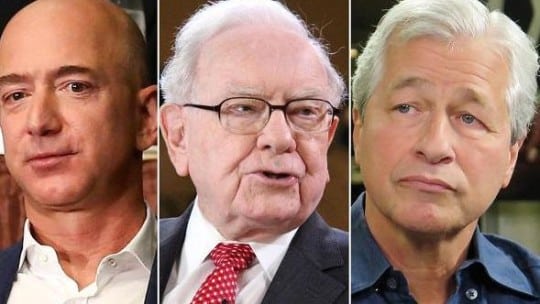
Say what you will about Tuesday's news from Amazon, Berkshire Hathaway and JPMorgan Chase—it will work marvelously, it will fail fabulously—the announcement arguably was the day’s biggest news. It shook the stock market and likely made CEOs, executives and boards of companies in the hospital, insurance and pharmaceutical sectors feel a bit more nervous and significantly less healthy.
The sentence in the trio’s news release that may have caused the blood pressure levels of the aforementioned executives to spike is this (emphasis mine): “The three companies, which bring their scale and complementary expertise to this long-term effort, will pursue this objective through an independent company that is free from profit-making incentives and constraints."
In a sense, it almost doesn’t matter if the venture works or not. It’s terrific external and internal public relations.
The only thing Americans love more than a superhero is a coalition of superheroes. That’s essentially what Tuesday’s announcement accomplished: It reminded the public that Amazon, Berkshire Hathaway and JPMorgan Chase are three of the world’s most powerful and innovative companies and that they’re uniting to take on the big, bad enemy of us all—rising healthcare costs.
The Film Comes Next
Word from the West Coast is that Steven Spielberg has contacted Tom Hanks to play Jeff Bezos in a blockbuster film he's directing about the alliance, due out during summer 2019. It’s rumored that Liam Neeson is Spielberg’s choice to portray Jamie Dimon and Sir Anthony Hopkins seems a cinch to play Warren Buffett. John Williams has been at his piano since last evening working on the rudiments of a soundtrack.
Seriously, from a PR perspective (internally and externally), who doesn’t want to work at a company that is perceived as a superhero, a technological disrupter of the first order, combating one of the scourges of modern life? What PR pro doesn't want to represent a company like this? Corporate reputation auditors, bring it on.
A Slice of Humble Pie
Americans also love their heroes to be humble. Although these are three huge companies, they seasoned their brief announcement with plenty of underdog references. The companies are positioning themselves as heroes, yes, but also as small, intense Davids against the Goliath of healthcare costs.
Buffett long has rallied against rising healthcare costs, famously referring to them as “a tapeworm” eating away at the American economy. He repeated that wonderful phrase Tuesday. He also added Davidic humility: “Our group does not come to this problem with answers. But we also do not accept it as inevitable.” Bravo, Warren!
Amazon’s Bezos joined the chorus: “The healthcare system is complex, and we enter into this challenge open-eyed about the degree of difficulty. Hard as it might be, reducing healthcare’s burden on the economy while improving outcomes for employees and their families would be worth the effort.”
Dimon of JPMorgan played up the "T" word—transparency—a term near and dear to PR pros: “Our people want transparency, knowledge and control when it comes to managing their healthcare.” His most important contribution to cast the alliance as a societal hero, though, was in this next line: “…our goal is to create solutions that benefit our U.S. employees, their families and, potentially, all Americans.”
Profiles
Yes, this announcement likely will produce a boom in recruitment, not that any of the three companies involved need much help in this department.
Another PR win: The announcement also raised the profiles of the three CEOs involved. This at a time when Edelman's 2018 Trust Barometer, noting a decline in the public's trust in government, has urged CEOs to act rather than wait for governments to solve problems.
Gil Bashe, managing partner, global health, Finn Partners, sums it up this way: “At every step, these enterprises—representing investment, finance and supply-chain management power—have achieved two key goals: They are seeking to reduce their health-cost footprint and model a national solution. For their employees and prospective employees, the combination of business vision meeting national urgency makes them feel they’re on the societal winning team.”
And at a time when the public, particularly millennials, has made it clear that companies need to stand for something more than profits, Amazon, Berkshire Hathaway and JPMorgan Chase knocked one out of the park yesterday.
Seth Arenstein is editor of PR News. Follow him: @skarenstein
